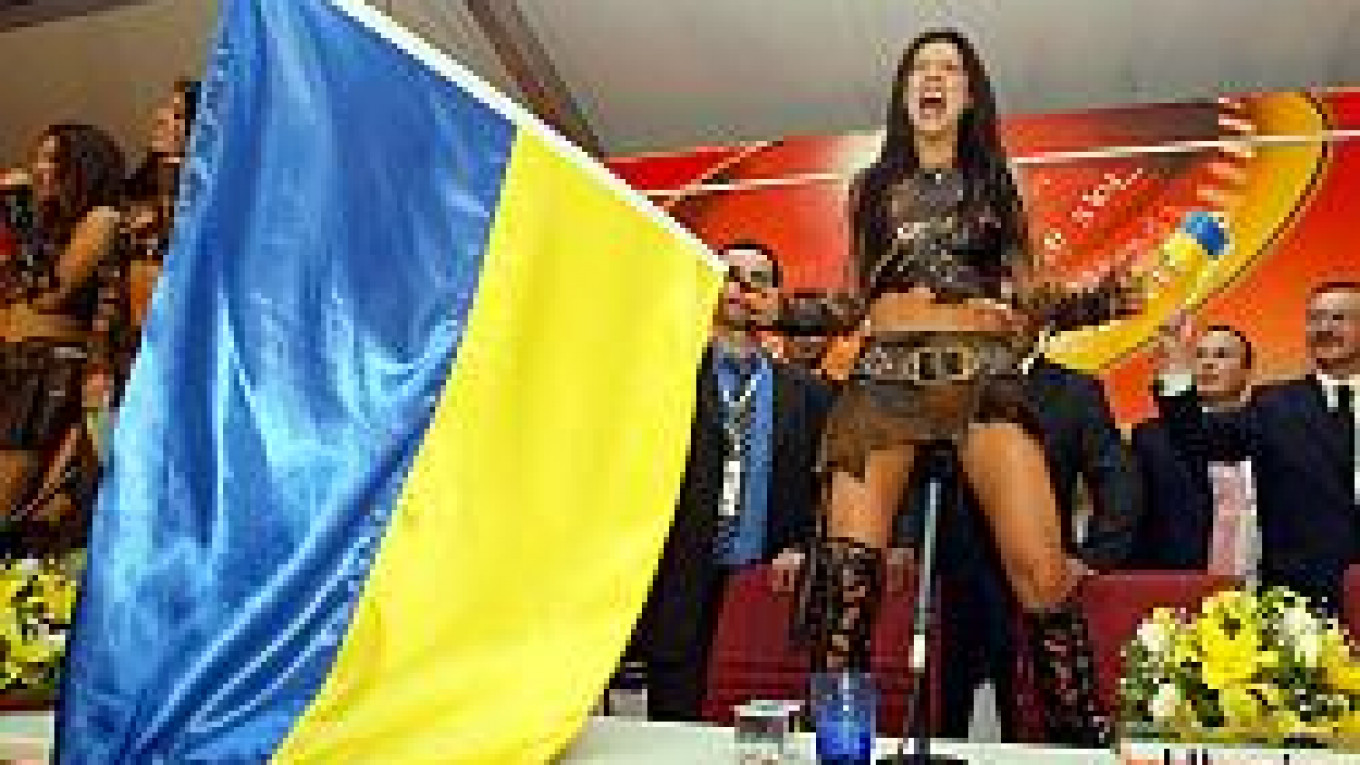Singer Ruslana, a cult figure in Ukraine, was accompanied by a group of dancers in warrior costumes intended to evoke the Carpathian Mountains.
"All of us are making a positive image of Ukraine. I want my country to open up before you with friendship and hospitality," an ecstatic Ruslana told a news conference after the show.
"I would like you to forget about Chernobyl," she said, referring to the 1986 nuclear accident that has long tarnished Ukraine's image.
The Eurovision Song Contest, hosted for the first time by Turkey, winner of last year's event, attracts an annual worldwide audience of more than 100 million people.
With its victory Ukraine earns the right to stage the 50th Eurovision Contest in 2005.
Asked what would be the first thing she did after returning to Kiev, Ruslana said: "I will do as Russell Crowe in 'Gladiator.' I will kneel in my homeland, take a piece of Ukrainian earth and kiss it."
"Wild Dance" was taken from her best-selling album of the same name, which was the first ever to go platinum in Ukraine.
The song, sung partly in Ukrainian and partly in English, is described as a modern take on traditional Ukrainian ethnic music based on ancient rhythms and dances, mixing rock with ethnic dance music.
This year's Eurovision produced its usual mixed bag of talent, corny lyrics, flamboyant performances and partisan voting, which are part of the competition's enduring popularity.
Turkey stood out from among the mixture of romantic ballads and disco numbers with the youthful Athena, one of the country's best-known bands, which plays a mixture of ska and punk music.
They won the loudest applause of the night from an enthusiastic local crowd waving red and white Turkish flags.
Last year's winner, Sertab Erener, opened the show accompanied by whirling dervish dancers with the song that won last year's contest in Riga, Latvia.
The performance by Serbia and Montenegro, which landed second place, began with a reed flute solo and included a violin solo with a strong Balkan folk flavor.
Greek heartthrob Sakis Rouvas came in third.
Russian singer Julia Savicheva was placed 11th out of 24 finalists with her English-language ballad "Believe Me," which received its sole 12 points from Belarus.
Many countries set aside politics when awarding their votes. Turkey gave high points to historic rival Greece, and Croatia awarded its top marks to Serbia and Montenegro, its former partners in the old Yugoslavia.
It was the biggest-ever competition with 36 countries taking part in a two-stage event. Ten nations battled through from a qualifying round to join 14 countries already in the final.
Just seven competed in the inaugural year of 1956.
Many established artists steer well clear of Eurovision, fearing it will do more harm than good to their reputation. But it has also produced superstars like Sweden's ABBA, which won in 1974 with "Waterloo."
Security was tight for the event. Istanbul experienced four devastating bomb blasts last November blamed on Islamist militants in which 61 people were killed.
Next month, the city will host U.S.? President George W. Bush and other Western leaders for a NATO summit.
A Message from The Moscow Times:
Dear readers,
We are facing unprecedented challenges. Russia's Prosecutor General's Office has designated The Moscow Times as an "undesirable" organization, criminalizing our work and putting our staff at risk of prosecution. This follows our earlier unjust labeling as a "foreign agent."
These actions are direct attempts to silence independent journalism in Russia. The authorities claim our work "discredits the decisions of the Russian leadership." We see things differently: we strive to provide accurate, unbiased reporting on Russia.
We, the journalists of The Moscow Times, refuse to be silenced. But to continue our work, we need your help.
Your support, no matter how small, makes a world of difference. If you can, please support us monthly starting from just $2. It's quick to set up, and every contribution makes a significant impact.
By supporting The Moscow Times, you're defending open, independent journalism in the face of repression. Thank you for standing with us.
Remind me later.


